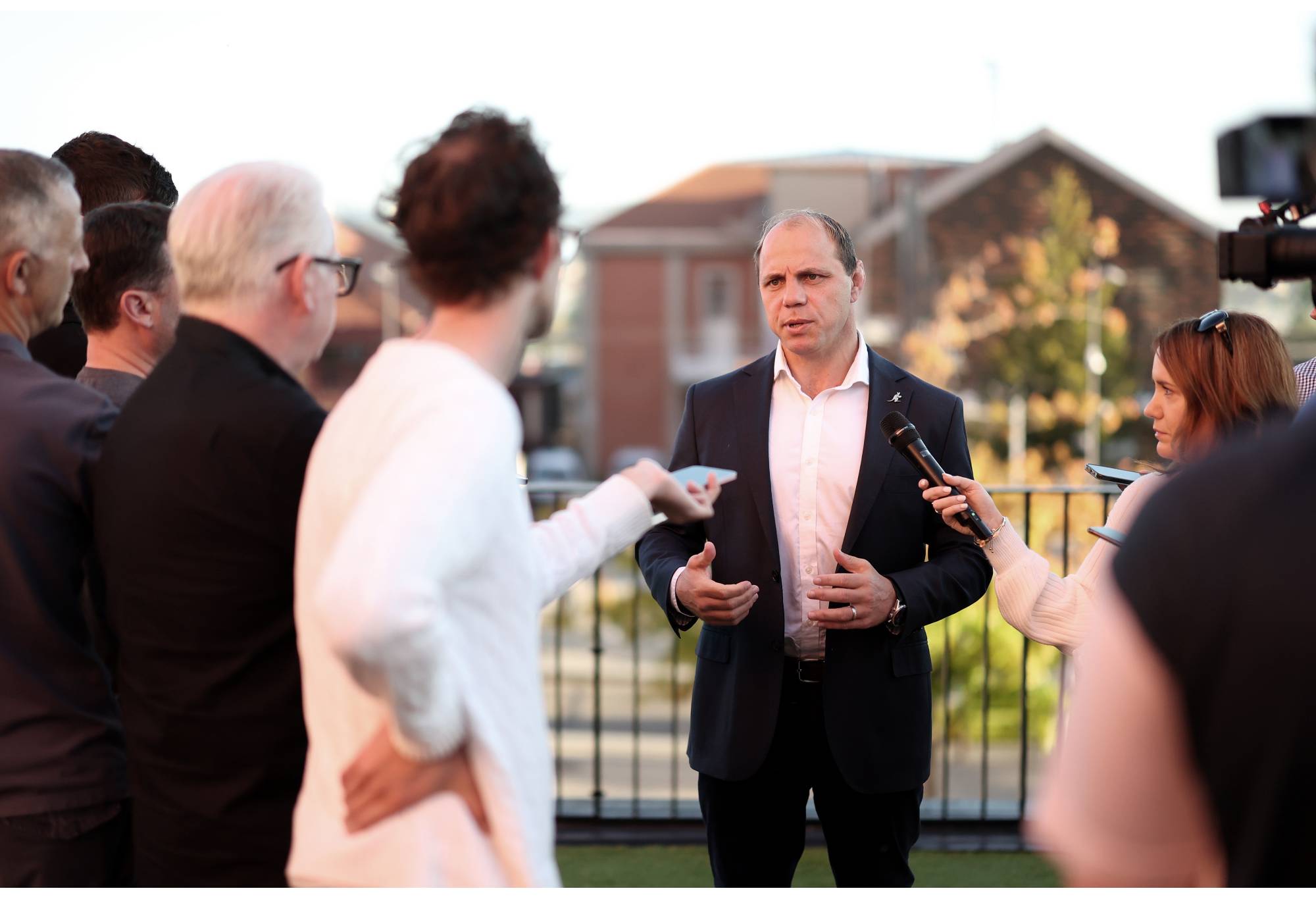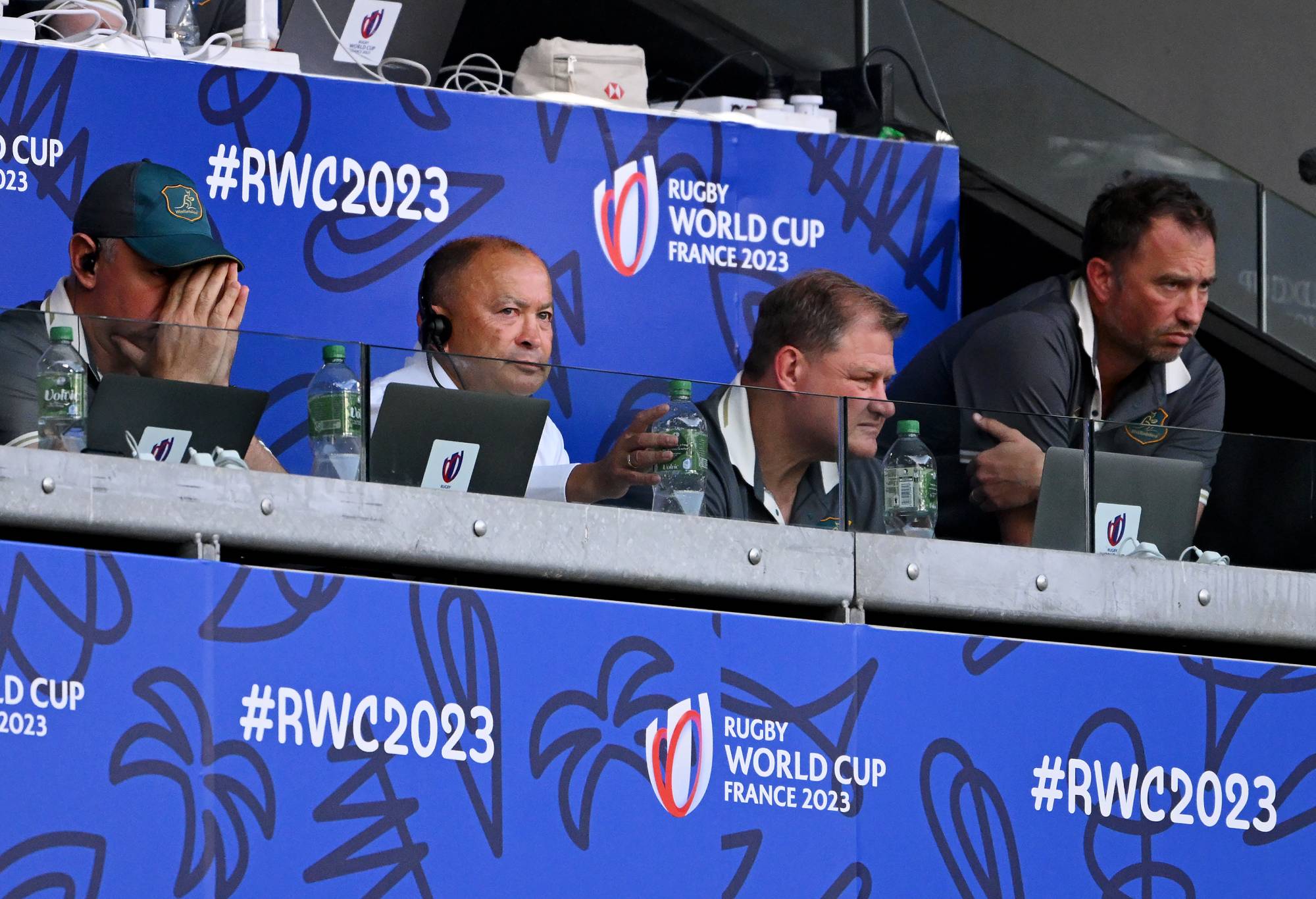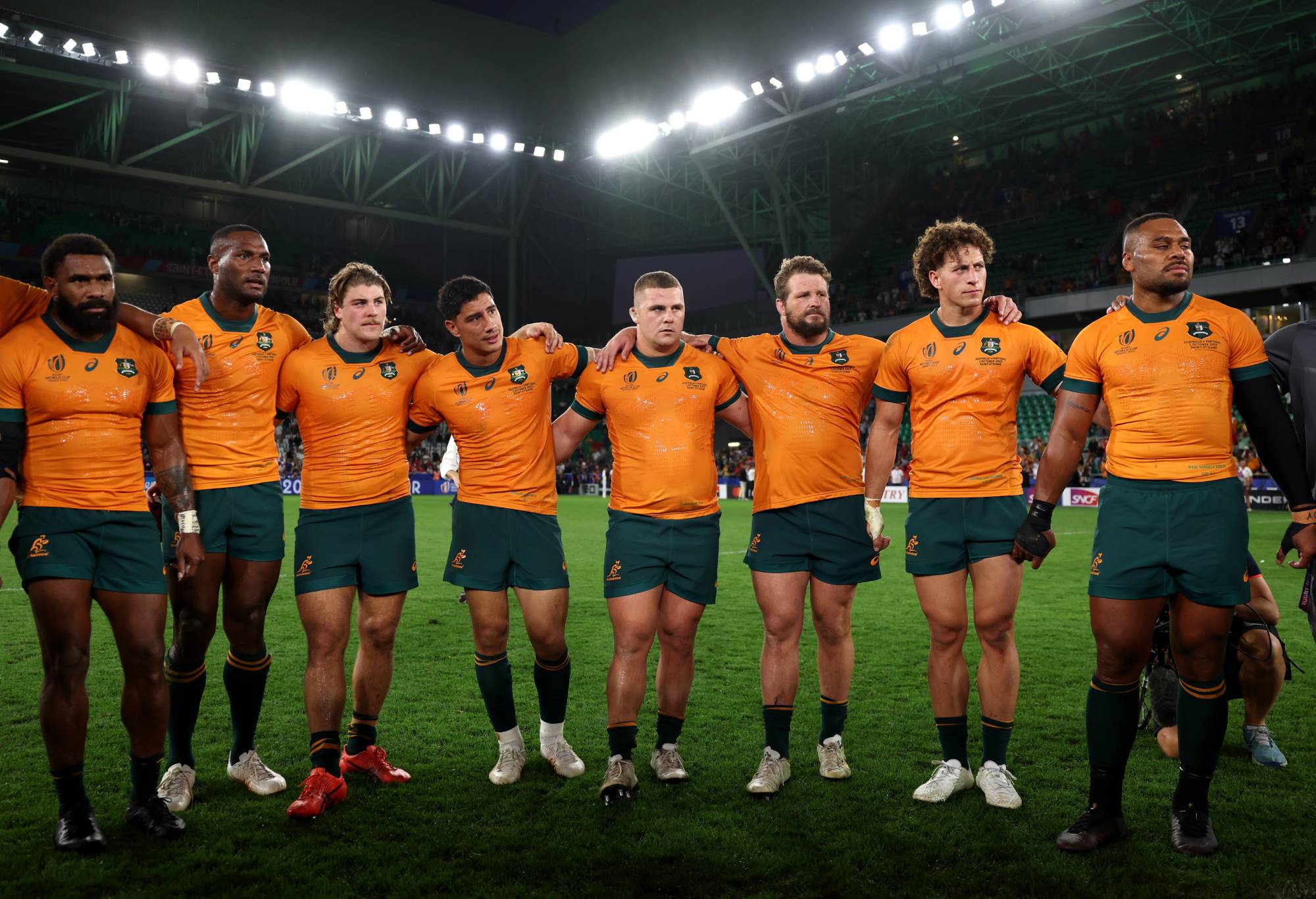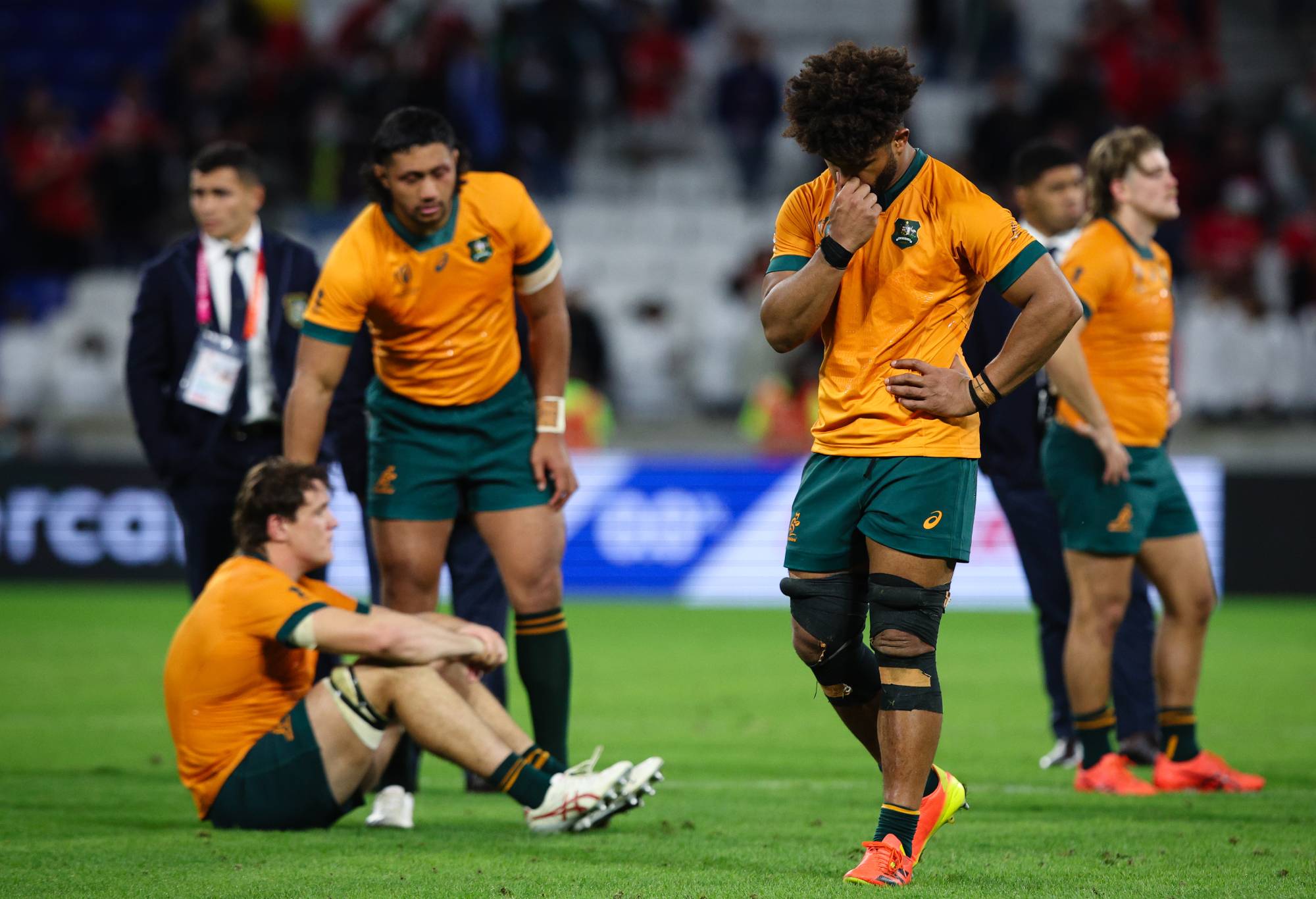Rugby Australia will conduct a review into their World Cup flop, but chief executive Phil Waugh says the governing body is “committed” to under-siege Wallabies coach Eddie Jones and believes the national team’s shortcomings are a result of years of systemic issues plaguing the sport.
“I think [we’ve been] pretty forthright around the fact that we’re committed to Eddie and he probably looks at the campaign and is bitterly disappointed about his performance and the Wallabies’ performance,” Waugh told reporters on Monday morning.
“I think this is not so much around chopping and changing coaches as it is around actually just fixing the system. It’s pretty evident when we lose a couple of players, the depth of the player that we’re bringing through is not necessarily up to it.
“And you’re not going to win World Cups or win international games if you don’t have that depth and system supporting the national team.”
Save for a Fijian capitulation against Portugal next weekend in Toulouse, the Wallabies will be eliminated in the pool stage of a World Cup for the first time in the 10 editions to date.
The failure to control their destiny came after consecutive Pool C defeats, as they lost to Fiji 22-15 – their first defeat to the Pacific nation in 69 years – before being humbled 40-6 by Wales a week later in Lyon.
A 34-14 bonus point win over Portugal on Sunday kept the Wallabies’ hopes of progressing out of the World Cup pool stages, but should Fiji get at least a losing bonus point against the European nation next Sunday they will leapfrog ahead of them and secure their quarter-final qualification.
“[The campaign’s] been bitterly disappointing,” Waugh said.
“We came here with a lot of hope and optimism and we sit here now, everything is out of our hands and we’ve got to pray that Portugal gets up against Fiji next week. [I’m] very disappointed with the journey to where we are today and we’ve got a lot of work to do.”

Rugby Australia CEO Phil Waugh speaks to the media on October 02, 2023 in Saint-Etienne. (Photo by Chris Hyde/Getty Images)
While Waugh didn’t want to nitpick Jones’ World Cup selection, saying “hindsight is a wonderful thing”, he said he didn’t subscribe to building a team during a World Cup for the next campaign.
“I think you come to a World Cup looking to win, you don’t go looking to win the 2027 World Cup when you’re going to the 2023 World Cup,” Waugh said.
“A lot of people spent a lot of money to come over here and support the Wallabies and they came here hoping to win the World Cup, and that was certainly our expectation or our commitment.
“I’d much prefer to talk about the disappointment of not performing to where we’d like rather than the excuses that we’re building for 2027 because I just don’t think that washes and that’s good enough.”
Add the circus surrounding Jones’ future, and the Wallabies have made it easy to become Australian sport’s punching bag.
Waugh, who spent an entire day with the Wallabies last week, once again reiterated that he had been assured by Jones that there was nothing in the reports linking him to a bombshell return to the Japan Rugby Football Union less than one season into a five-year deal.
While the Wallabies’ failures have come to a head throughout this World Cup campaign, Waugh pointed to the national team’s decline since making the 2003 final as proof their struggles went beyond Jones’ side.
The former Wallabies captain, who played under Jones at the 2003 World Cup, is the latest Rugby Australia boss to highlight the game’s struggles.
But what can be done?

Wallabies coach Eddie Jones (2nd left) with his assistants during their win over Portugal at Stade Geoffroy-Guichard on October 01, 2023 in Saint-Etienne. (Photo by Laurence Griffiths/Getty Images)
Waugh once again referred to RA’s desire to undergo a “strategic reset” and become more aligned, pointing to their August announcement that the five Australian Super Rugby franchises had agreed in principle to work closer together.
Since then, however, the ACT Brumbies have expressed reservations about moving towards a centralised system while others, including the Queensland Reds, are also concerned about RA being the chief decision makers regarding high performance and commercial decisions.
Waugh acknowledged that RA – formerly the Australian Rugby Union – had not helped themselves in building trust, but said it was vital the game came together to help get back on track and move in the same direction.
“If you look at this campaign, we haven’t built a lot of trust across the system, so as you go to a central function, where more influence comes through Rugby Australia, it’s really important to build that trust and credibility and I think over a period of time that’s declined, so it’s really important for us to work with our stakeholders,” Waugh said.

The Wallabies form a huddle following their World Cup win over Portugal at Stade Geoffroy-Guichard on October 01, 2023 in Saint-Etienne. (Photo by Chris Hyde/Getty Images)
Waugh said this year’s World Cup failure was an example of not doing what the governing body had said it would.
“What we haven’t over time is delivered on what we said we were going to deliver and so whilst we have this great vision, it’s really important to build trust with our stakeholders and our member unions to believe that we can deliver on the vision because I do think we’ve got a really strong vision on that alignment across the system,” he said.
Whether RA can eventually usher its alignment piece of the puzzle across the line, which likely represents moving to a centralised model, threatens to make or break the current administration.
Waugh also said RA remained “committed” to five Super Rugby franchises.
Already several Super Rugby franchises are on the brink of financial collapse, with the Waratahs on the cusp of being taken over by Rugby Australia.
Waugh admitted that some Super Rugby franchises might rally in behind RA’s bid to move towards a centralised model quicker than others.
“I don’t think you’re going to have everybody all at the same time,” he said.
“It’s about building the credibility and the trust.
“Initially it might be two or three per Rugby clubs and then, as we go forward, hopefully others come in.
“It’s as much about off-field performances as it is on-field. We certainly feel that if we can be more efficient with how we go to market on some of the commercial aspects, then it’s not just an on-field benefit, we’ll get an off-field benefit as well.
“I genuinely believe it’s actually building trust and credibility – something we haven’t necessarily instilled across the system for a long period of time.”

The Wallabies’ World Cup campaign blew up following defeat to Wales at Parc Olympique on September 24, 2023 in Lyon. (Photo by Craig Mercer/MB Media/Getty Images)
Meanwhile, Waugh will meet New Zealand Rugby counterpart Mark Robinson, as well as the new Super Rugby chairman Kevin Malloy, on Monday afternoon as the trans-Tasman partners consider the rise of the Six Nations and how they can help each other.
“One piece is the focus around Super Rugby and where Super Rugby is going and I’m catching up with Mark Robinson this afternoon,” Waugh said.
“I think actually how we align and work together with New Zealand to ensure that the southern hemisphere remains dominant – and you think he has been nine World Cups and the southern hemisphere has won eight of them – unfortunately, I was in the one we didn’t.
“It’s really important for us to work really closely with New Zealand in particular, but I also think the growth of the Pacific Islands and also Argentina, and then the close relationship with South Africa.
“There has been a shift, certainly in club rugby, up into the north. Often people talk about the north catching up to the south, but when it comes down to crunch, historically, New Zealand, and South Africa have done particularly well and we’ve had the potential to do well we just haven’t nailed it.
“I don’t want to get too radical on law variations in the Australia and New Zealand market. But how do we actually create a game that is more appealing to our spectators? And I think that’s part of the commission and the purpose of the commission.”
































































































